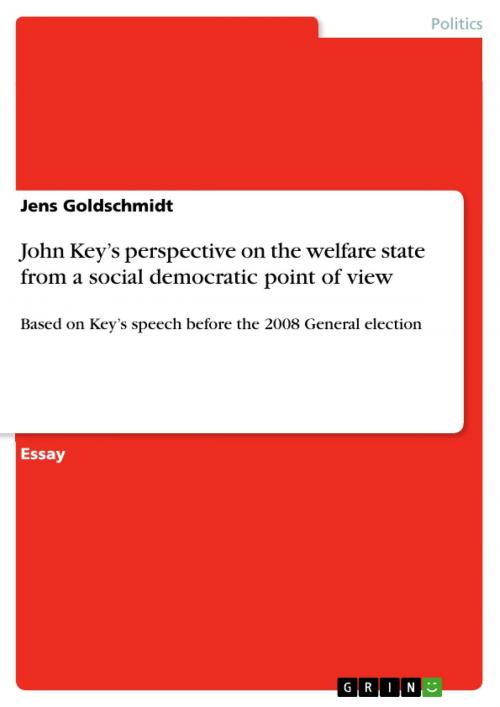John Key's perspective on the welfare state from a social democratic point of view
Based on Key's speech before the 2008 General election
Nonfiction, Social & Cultural Studies, Political Science, Government, Public Affairs & Administration| Author: | Jens Goldschmidt | ISBN: | 9783656292463 |
| Publisher: | GRIN Verlag | Publication: | October 18, 2012 |
| Imprint: | GRIN Verlag | Language: | English |
| Author: | Jens Goldschmidt |
| ISBN: | 9783656292463 |
| Publisher: | GRIN Verlag |
| Publication: | October 18, 2012 |
| Imprint: | GRIN Verlag |
| Language: | English |
Essay from the year 2009 in the subject Politics - International Politics - Region: Other States, grade: 2,0, Massey University, New Zealand (School of People, Environment and Planning), course: Politics and Public Policy in New Zealand, language: English, abstract: There are two main stances concerning welfare policy, namely the neo-liberal and the social democratic point of view. In this essay a speech by John Key, held before the 2008 General Election about his perspective on the welfare state will be reflected. Key makes numerous remarks about the individual responsibility of the people, which clarify his view on welfare policy. Thus, the neo-liberal perspective Key takes on the appropriate role of the welfare state and the nature and extent of individuals' responsibilities for their personal circumstances will be articulated. Afterwards the neo-liberal stance will be criticized from a social democratic perspective. Neo-liberals have a clear view on the appropriate role of the welfare state: They see welfare policy overall not as a central part of their politics. As Harvey (2006, p. 25) puts it, the neo-liberal state 'withdraws from welfare provision and diminishes its role as far as possible in the arenas of health care, public education and social services [...]'. One can find evidence for Key having the same view on welfare issues by reading his speech. For example, he bares that he is willing to support people when they are most in need (Key, 2008), which can be regarded as a sign for not having much interest in providing comprehensive welfare support for everyone in need. This impression is also strengthened by Key's idea 'to give people a kick in the pants when they are not taking responsibility for themselves, for their families, and for the taxpayer' (Key, 2008). Especially mentioning the taxpayer reveals that Key does not want the state to come up for people, who don't have an interest in finding new employment or who rely completely on the state.
Essay from the year 2009 in the subject Politics - International Politics - Region: Other States, grade: 2,0, Massey University, New Zealand (School of People, Environment and Planning), course: Politics and Public Policy in New Zealand, language: English, abstract: There are two main stances concerning welfare policy, namely the neo-liberal and the social democratic point of view. In this essay a speech by John Key, held before the 2008 General Election about his perspective on the welfare state will be reflected. Key makes numerous remarks about the individual responsibility of the people, which clarify his view on welfare policy. Thus, the neo-liberal perspective Key takes on the appropriate role of the welfare state and the nature and extent of individuals' responsibilities for their personal circumstances will be articulated. Afterwards the neo-liberal stance will be criticized from a social democratic perspective. Neo-liberals have a clear view on the appropriate role of the welfare state: They see welfare policy overall not as a central part of their politics. As Harvey (2006, p. 25) puts it, the neo-liberal state 'withdraws from welfare provision and diminishes its role as far as possible in the arenas of health care, public education and social services [...]'. One can find evidence for Key having the same view on welfare issues by reading his speech. For example, he bares that he is willing to support people when they are most in need (Key, 2008), which can be regarded as a sign for not having much interest in providing comprehensive welfare support for everyone in need. This impression is also strengthened by Key's idea 'to give people a kick in the pants when they are not taking responsibility for themselves, for their families, and for the taxpayer' (Key, 2008). Especially mentioning the taxpayer reveals that Key does not want the state to come up for people, who don't have an interest in finding new employment or who rely completely on the state.















